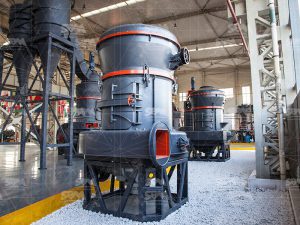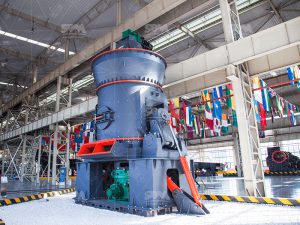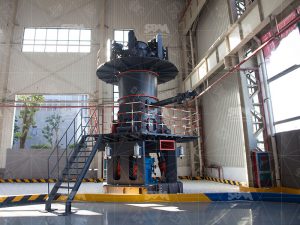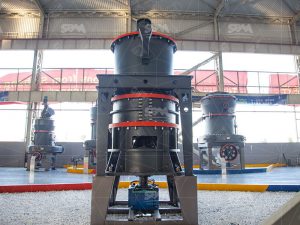Bentonite is a versatile industrial mineral primarily composed of montmorillonite, a clay mineral with excellent absorption and swelling properties. It is widely used in industries like drilling, construction, and environmental protection. However, for it to be fully functional in these applications, it must be processed into a fine powder. The key to transforming raw bentonite into a usable material lies in the grinding process, where specialized grinding mills play a crucial role. This article provides a comprehensive overview of bentonite, its applications, and the grinding technology required to process it.
Bentonite is typically mined as a soft rock but has unique properties that distinguish it from other clay minerals. Its ability to absorb large amounts of water, swell, and form a thixotropic gel makes it valuable across a variety of industries. The two main types of bentonite are sodium bentonite and calcium bentonite, both with distinct swelling behaviors and applications.
To make bentonite suitable for industrial applications, it needs to be processed into a powder with consistent particle size. This process involves drying, grinding, and sometimes chemical activation. The particle size of bentonite after grinding typically ranges from 200 to 500 mesh (74–30 microns). This fine particle size is required to maximize the surface area of bentonite for enhanced functionality in applications like adsorption and viscosity control.
The grinding of bentonite is a delicate process, as the clay is both soft and prone to becoming compacted during grinding. Specialized grinding mills are designed to prevent issues like over-grinding, moisture retention, and material agglomeration.
Bentonite’s versatility stems from its diverse properties, including water absorption, ion exchange capacity, and its ability to form stable gels in liquids. As a result, bentonite powder is used across a variety of sectors:
Bentonite is used as a drilling mud in oil and gas exploration. The finely ground bentonite powder, when mixed with water, forms a viscous fluid that lubricates the drill bit, stabilizes the borehole, and controls the pressure in the well. Bentonite’s swelling and sealing properties make it ideal for preventing fluid loss in drilling operations.
In the foundry industry, bentonite serves as a binding agent in molding sand. The fine powder binds sand particles together, creating a moldable mixture that retains its shape when molten metal is poured into it. This is critical for producing detailed, high-quality metal castings.
Bentonite is widely used in construction for applications such as tunneling and trenching. It acts as a lubricant and sealant in slurry walls, aiding in the stability of excavation sites. Its expansive properties help in creating impermeable barriers, essential for constructing dams, foundations, and landfills.
Bentonite is often used in environmental applications, such as lining landfills, waste containment sites, and ponds. Its high swelling capacity creates a watertight barrier, preventing the leakage of hazardous materials into the environment. Finely ground bentonite is crucial for ensuring a uniform and impermeable layer.
In agriculture, bentonite is used as a soil conditioner and carrier for pesticides. Its fine powder helps improve soil structure, water retention, and nutrient availability. Bentonite’s ability to absorb and release moisture makes it valuable in arid regions for sustaining crop growth.
Bentonite’s adsorptive properties make it useful in the cosmetics and pharmaceutical industries. It is used in products like face masks, creams, and detoxifying treatments for its ability to draw out impurities from the skin. In pharmaceuticals, it acts as a stabilizer and thickener in ointments and medications.
The key to unlocking the full potential of bentonite is its processing, specifically the grinding process. To produce bentonite powder that meets the requirements for various industrial applications, advanced grinding mills must be employed. Below is a breakdown of the technology involved in bentonite powder production:
Bentonite is usually mined and transported to processing plants in a relatively raw state. The first step is to crush the raw material to reduce the size of the larger lumps. This step is necessary for the next stages, which involve drying and grinding.
Since bentonite is naturally moisture-rich, the drying stage is crucial for reducing moisture content to an optimal level before grinding. Rotary dryers or flash dryers are typically used in this stage. The drying process ensures that the bentonite reaches a moisture content below 10%, which is essential for efficient grinding and product consistency.
The most critical stage in bentonite processing is grinding. Specialized grinding mills are designed to handle the soft and sticky nature of bentonite, preventing material compaction and ensuring uniform particle size distribution. Several grinding mills are suitable for bentonite processing:
MTW European Trapezium Mill: This mill is ideal for producing fine powders with consistent particle sizes, ranging from 80 to 425 mesh. It is equipped with advanced powder selection technology, ensuring precise control over the final product’s fineness.
LM Vertical Mill: The LM Vertical Mill integrates drying, grinding, and material conveying, making it highly efficient for processing bentonite in large-scale production. It ensures consistent product quality and is capable of producing powders with varying particle sizes for different applications.
SCM Ultrafine Mill: When extremely fine bentonite powders are required, the SCM Ultrafine Mill is the ideal choice. It produces powders with particle sizes as fine as 3250 mesh, which are essential for applications such as cosmetics and pharmaceuticals.
After grinding, the bentonite powder undergoes classification to separate finer particles from coarser ones. Modern mills are equipped with built-in classifiers that ensure the final product meets the desired fineness requirements. For fine bentonite powders, efficient air classifiers and dust collectors are crucial for capturing the fine particles without material loss.
Throughout the grinding process, quality control is critical to ensure consistency in the final product. Key parameters such as particle size distribution, moisture content, and chemical composition must be regularly monitored to meet industry specifications.
Once the bentonite powder has been ground to the desired fineness, it is packaged for transportation and storage. Depending on the application, the powder may be packed in large bags or containers. Proper storage conditions, such as maintaining low moisture levels, are necessary to preserve the quality of bentonite over time.

MTW European Grinding Mill is innovatively designed through deep research on grinding mills and development experience. It absorbs the latest European powder grinding technology and concept, and combines the suggestions of 9158 customers on grinding mills. This grinding mill perfectly satisfies the production demands of the customers on 200-33μm (80-425Mesh) fine powder.

Based on the absorption of advanced technologies of famous international corporations and 30 years’ experience in grinding mill production, SBM has launched the LM Vertical Grinding Mill which integrates five functions of crushing, grinding, powder selection, drying and material conveying. It is characterized by centralized technological process, small occupational area, low investment, high efficiency, energy conservation and environment protection.

LUM Ultrafine Vertical Grinding Mill is independently designed by SBM on the basis of years of experience in grinding mill production. LUM grinding mill adopts the latest Taiwan grinding roller technology and German powder separating technology. The ultrafine vertical grinding mill integrating ultrafine powder grinding, grading and transporting has become a better choice in the ultrafine powder grinding industry.

SCM Ultrafine Grinding Mill is a new superfine powder (325-2500 mesh) production equipment developed through accumulating years of experience in grinding mill production, absorbing Swedish advanced machine manufacturing technology, and undergoing many years of tests and improvements. The SCM Ultrafine Grinding Mill is the result of combination of advanced Chinese and Swedish technologies. Meanwhile, it symbolizes the new development and new science in the grinding world.